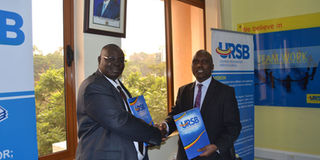DPP joins fight against money laundering

Mr Sydney Asubo (L), the executive director Financial Intelligence Authority, shakes hands with Mr Bemanya Twebaze, the registrar general Uganda Registration Service Bureau, after signing an MoU. photo BY JONATHAN ADENGO
What you need to know:
Regulation. Government has a law in place to fight the vice
Kampala.
In order to rid the economy of the ills associated with money laundering and terrorist financing, the Financial Intelligence Authority (FIA) has signed a Memorandum of Understanding (MoU) with the Directorate of Public Prosecutions (DPP) and Uganda Registration Services Bureau (URSB).
The signing of the MoU is meant to ease the free flow of information between the government agencies, a move aimed at minimising the bureaucracy that is associated with government institutions.
Money laundering, according to oxforddictionaries.com, is the concealment of the origins of illegally obtained money, typically by means of transfers involving foreign banks or legitimate businesses.
Money laundering is a crime under the laws of Uganda.
While signing the MoU with the directorate, FIA executive director Sydney Asubo said the move will enable them to beat the 48-hour rule in which FIA is mandated to freeze the bank accounts of someone declared a terrorist by the Internal Affairs ministry.
He added that besides moving in and freezing the bank accounts of someone declared a terrorist, FIA is supposed to alert the DPP within the same 48-hour period to commence investigations. “One of the major benefits that FIA is expected to get from this partnership is the removal of the red tape that has been associated with government bodies. This means that we shall have a fast information sharing process amongst ourselves in a bid to fight money laundering and combat terrorism,” said Mr Asubo.
Speaking at the same function, the DPP Mike Chibita said the move was a good indicator to ensure that any ‘dirty’ money in the financial system is to be detected and that the bad guys involved will be brought to book.
“ To us as the prosecuting body, we shall ensure that any suspected dirty money is investigated and the bad guys behind the same are brought to book…” the DPP assured the FIA team headed by Mr Asubo.
Mr Chibita added that this partnership will also help them to fight the emerging global threat of terrorism, a reality that Uganda has experienced following the July 2010, Kampala twin bombings. The DPP also revealed that the money that was used to finance the Kampala twin bombings at Kyadondo Rugby Club and Ethiopian Village Restaurant that left at least 76 people dead, was sent from United Kingdom (UK) through money laundering.
He added that the UK government has, however, not cooperated with Ugandan investigators to avail them with the evidence to that effect on grounds that Uganda’s laws permit death penalty and yet the UK government does not subscribe to the same maximum punishment.
The FIA is a government body that was established in 2013 under the Anti-Money Laundering Act to combat money laundering activities in the country.
According to Mr Asubo, the new partnership with URSB is aimed at having a quick verification of registration status of queried companies whose bank accounts might raise suspicion.
Mr Asubo also revealed that so far, FIA has signed MoUs with capital markets and 15 regional countries including Kenya, Tanzania, Sudan, Ethiopia, South Africa, Namibia and Angola in a move to combat money laundering activities and fight against terrorism in the region and continent.
In October 2013, Uganda joined her East African neighbours of Kenya and Tanzania by passing the Anti-Money Laundering Act, 2013.
The law came into force in November the same year.
About the law
The Anti Money Laundering Act 2013 provides a legal avenue through which government and key stakeholders can fight the vice.
It aims at prohibiting and preventing money laundering through combating money laundering activities by imposing certain duties on institutions and other persons who may be used for money laundering purposes, thereby regulating the money laundering sphere.




